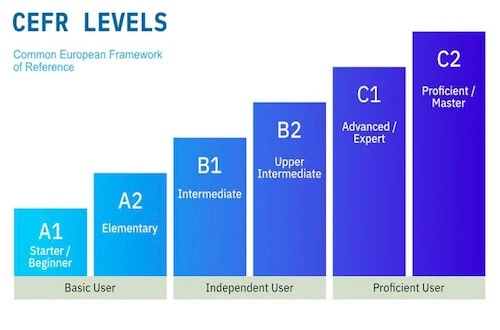Cambridge English: B1 Preliminary (PET)
Take this test if you wish to confirm your intermediate-level English proficiency. Having this level of English will enhance your enjoyment of vacations in English-speaking nations. It’s advisable to consider further studies once you have successfully completed the B1 Preliminary exam.
- A1 – Beginner
- A2 – Elementary
- B1 – Intermediate
- B2 – Upper-Indermediate
- C1 – Advanced
- C2 – Proficient

A Guide to PET
The PET examination is part of a group of examinations developed by Cambridge ESOL called the Cambridge Main Suite. The Main Suite consists of five examinations which have similar characteristics but are designed for different levels of English language ability. Within the five levels, PET is at Level B1 (Threshold) in the Council of Europe’s Common European Framework of Reference for Languages: Learning, teaching, assessment. It has also been accredited in the UK as an Entry Level 3 ESOL certificate in the National Qualifications Framework.
PET is a popular exam with candidates who are learning English out of personal interest and for those who are studying for employment reasons. It is also useful preparation for higher level exams, such as FCE (First Certificate in English), CAE (Certificate in Advanced English) and CPE (Certificate of Proficiency in English). If you can deal with everyday written and spoken communications (e.g. read simple textbooks and articles, write simple personal letters, make notes during a meeting), then this is the exam for you.
PET Topics
These are the topics used in the PET exam:
Clothes
Hobbies and leisure
Daily life
House and home
Relations with other people
Services
Education
Language
Shopping
Entertainment and media
Natural world
Social interaction
Environment
People
Sport
Transport
Food and drink
Free time
Health, medicine and exercise
Personal feelings, opinions and experiences
Personal identification
Places and buildings
Travel and holidays
Weather
Work and jobs
What is your English level?
Find out your A1 A2 B1 B2 C1 C2 level of English with our quick, free online test.
Cambridge Preliminary
The Cambridge English B1 Preliminary examination, formerly referred to as the PET exam (Preliminary English Test), is intended for individuals with intermediate-level English proficiency. Similar to all Cambridge English assessments, the PET Exam is scored on a pass/fail basis, and successful candidates receive a certificate with no expiration date. The B1 Preliminary exam is available in two formats: as a traditional paper-based test or as a computer-based test. In both versions, the PET exam has a total duration of 140 minutes.
PET Exam structure
The B1 Preliminary exam assesses proficiency in all four language skills: listening, reading, writing, and speaking. Its structure is as follows:
Part 1 (45 minutes): This initial section of the PET Exam focuses on reading comprehension and comprises six subsections with a total of 32 questions. It includes various question formats like multiple-choice, matching, and fill-in-the-blank questions. Additionally, there are two writing tasks, involving a postcard and either a letter or a story.
Part 2 (45 minutes): This section of the B1 Preliminary exam evaluates writing skills. It was previously integrated into the first section but was separated into its distinct section in 2020. This part includes two writing prompts: an email and either an article or a story. Each written response should be around 100 words.
Part 3 (24 minutes + 6 minutes extra for transferring answers): The third section of the PET exam concentrates on listening comprehension. Candidates listen to each recording twice and are required to respond to questions related to the audio. This section contains a total of 25 questions, each worth one point. Question types include multiple-choice and fill-in-the-blank.
Part 4 (12 to 17 minutes): The final section of the B1 Preliminary exam assesses speaking abilities. Candidates are paired up and engage in a conversation with an examiner and each other, with a second examiner listening. The speaking test begins with the examiner asking questions about each student. Afterward, each student is presented with a picture to describe and discuss. Subsequently, the examiner presents a scenario for students to deliberate upon potential solutions. Lastly, the students discuss their likes and dislikes. Depending on the exam center’s scheduling, the speaking test may be administered on a different day from the first three parts of the B1 Preliminary.
PET Scoring:
Starting in 2016, all Cambridge English Examinations employ the same scoring scale. Tests at lower difficulty levels yield scores within the lower range of this scale, while more challenging tests can result in higher scores within the same scale. Previously, the PET had its own unique scoring system, which means that PET test scores prior to 2016 must be converted to the new scale for comparison purposes.
Current valid scores for the B1 Preliminary exam range from 120 to 170. Achieving a score of 140 or higher qualifies as a “pass,” and students attaining this score will receive the B1 Preliminary exam certificate, signifying a level B1 proficiency in English according to the CEFR (Common European Framework of Reference for Languages). Students who score 160 or higher on the PET Exam will be awarded a Cambridge Preliminary English Test certificate for a level B2. Those scoring between 120 and 139 will be granted an A2 English certificate.
Each section of the B1 Preliminary contributes 25% to the total score. The results are presented separately for the four parts of the exam, along with an overall result and the corresponding CEFR level. If a student attains a passing score on the B1 Preliminary, they will also receive a B1 English certificate, which remains valid indefinitely.
The subsequent examination in the Cambridge Exam series is known as the Cambridge B2 First Certificate. Taking the free Cambridge placement test can aid in determining which of the Cambridge exams is most suitable for your current English proficiency level.





